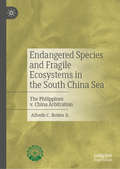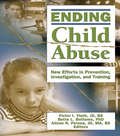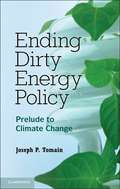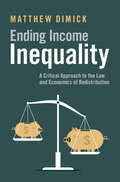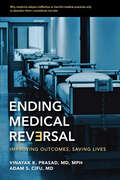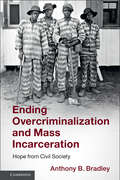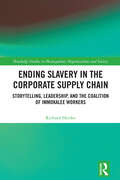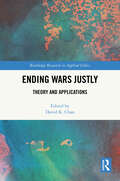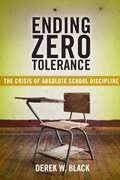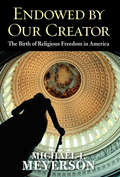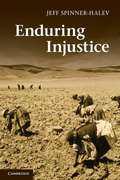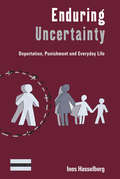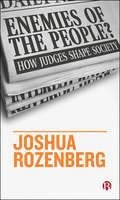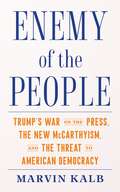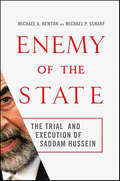- Table View
- List View
Endangered Species and Fragile Ecosystems in the South China Sea: The Philippines v. China Arbitration
by Alfredo C. Robles, Jr.This book presents an in-depth analysis of the environmental issues raised in the South China Sea Arbitration Awards, which have not attracted as much attention in the Philippines as the “nine-dash line”. Specifically it focuses on the conservation of endangered species and the conservation of fragile ecosystems in the South China Sea. The aims of the book are two-fold. First, it seeks to explain the Philippine perspective on the environmental aspects of its dispute with China. The book reconstructs the Philippine perspective in part by consulting several dozens of the hundreds of documents that the Philippines submitted to the Tribunal. Some of these documents were classified as secret and would thus have never been made available to the public had it not been for the arbitration. Second, it attempts to explain the decisions of the Tribunal on jurisdiction and admissibility as well as the decisions on the merits of the dispute. The book does this by consulting not only the two Awards but also the hundreds of pages of transcripts, expert reports, supplemental submissions and written responses by the Philippines to questions posed by the Tribunal.
Endeavor for Renewal
by M. Fethullah GulenTrue renewal is realized by retaining the purity of the seed and the root, and by synthesizing an entire inheritance of values with new thoughts and wisdom appropriate to the age. A thorough revival can only be realized with the efforts of the spirit, intellect, feelings, and willpower working in concert. Utilizing the spirit&’s power to the fullest, making flawless use of the knowledge inherited from the past, being constantly open to spiritual breezes of inspiration, not being trapped by blind imitation, and always following a sound methodology are some dynamics of an ideal renewal.The vigorous souls with steel willpower must keep running on the path of serving humanity with an insatiable love for research, an ever-evolving passion for knowledge of God, and an otherworldly profundity beyond comprehension. This book conveys the feelings and thoughts of a person who has dedicated his life for the coming of such a generation and who suffers, in heart and mind, for this noble ideal.
Ending Child Abuse: New Efforts in Prevention, Investigation, and Training
by Victor I. Vieth Bette L. Bottoms Alison PeronaGet the tools to coordinate a plan in your community!The highly anticipated Ending Child Abuse: New Efforts in Prevention, Investigation, and Training presents an exciting vision: to end or significantly reduce child abuse. Respected social scientists and legal scholars discuss empirically sound short- and long- term multidisciplinary strategies that can be implemented in our society. Innovative and well-established concepts and approaches are clearly presented, such as specialized education, rational preventative methods, effective investigation and prosecution strategies, and the analysis of factors that influence law enforcement investigations and child abuse prevention efforts.Several obstacles stand in the way of the elimination of child abuse, such as the failure to investigate most child abuse reports, inadequate training of frontline child protection professionals, lack of financial resources, and the dilemma that child abuse is not addressed at the youngest ages. Ending Child Abuse: New Efforts in Prevention, Investigation, and Training tackles these problems and others with practical guidelines and aggressive creative strategies that can be applied to every community in the United States. This collection is impeccably referenced and soundly supported with research.Ending Child Abuse: New Efforts in Prevention, Investigation, and Training discusses: implementation of a model curriculum in child advocacy for undergraduate and graduate institutions forensic interview training extensive education of the nation&’s child protection professionals development and funding of prevention programs at the community level educational reforms of Montclair State University in New Jersey designed to better prepare professionals who advocate for children research-based interview techniques with best practice guidelines possible broader social and system-level reforms vertical prosecution of child abuse cases-with a model for its operationEnding Child Abuse: New Efforts in Prevention, Investigation, and Training is an ambitious eye-opening source perfect for social services professionals, mental health professionals, practitioners, researchers, educators, students, and medical and legal professionals who deal with child abuse and children&’s welfare.
Ending Dirty Energy Policy
by Joseph P. TomainClimate change presents the United States, and the world, with regulatory problems of a magnitude, complexity and scope unseen before. The United States, however, particularly after the mid-term elections of 2010, lacks the political will necessary to aggressively address climate change. Most current books focus on climate change. Ending Dirty Energy Policy argues that the US will not adequately address climate change until it transforms its fossil fuel energy policy. Yet there are signs that the country will support the transformation of its century-old energy policy from one that is dependent on fossil fuels to a low-carbon energy portfolio. A transformative energy policy that favors energy efficiency and renewable resources can occur only after the US has abandoned the traditional fossil fuel energy policy, has redesigned regulatory systems to open new markets and promoted competition among new energy providers, and has stimulated private-sector commercial and venture capital investment in energy innovations that can be brought to commercial scale and marketability.
Ending Income Inequality: A Critical Approach to the Law and Economics of Redistribution
by Matthew DimickIncome inequality in America has been on the rise for decades, but policy and legal thought has yet to catch up. Both parties in the United States have been hesitant to intervene in the market to address this problem, while the income tax system has been touted as a better and more efficient way to tackle income inequality. However, the tax system itself has failed to keep pace with the widening gaps in income. Ending Income Inequality challenges arguments made by legal scholars in the field of law and economics, who have supported the tax system over redistributive legal rules. By examining specific areas of the law such as minimum wage, collective bargaining, antitrust law, intellectual property, and housing regulation, the book argues that using legal rules, in addition to income taxes, is a promising path to reverse rising inequality.
Ending Medical Reversal: Improving Outcomes, Saving Lives
by Vinayak K. Prasad Adam S. CifuWhy medicine adopts ineffective or harmful medical practices only to abandon them—sometimes too late.Medications such as Vioxx and procedures such as vertebroplasty for back pain are among the medical "advances" that turned out to be dangerous or useless. What Dr. Vinayak K. Prasad and Dr. Adam S. Cifu call medical reversal happens when doctors start using a medication, procedure, or diagnostic tool without a robust evidence base—and then stop using it when it is found not to help, or even to harm, patients.In Ending Medical Reversal, Drs. Prasad and Cifu narrate fascinating stories from every corner of medicine to explore why medical reversals occur, how they are harmful, and what can be done to avoid them. They explore the difference between medical innovations that improve care and those that only appear to be promising. They also outline a comprehensive plan to reform medical education, research funding and protocols, and the process for approving new drugs that will ensure that more of what gets done in doctors' offices and hospitals is truly effective.
Ending Overcriminalization and Mass Incarceration: Hope from Civil Society
by Anthony B. BradleyMass incarceration is an overwhelming problem and reforms are often difficult, leading to confusion about what to do and where to start. Ending Overcriminalization and Mass Incarceration: Hope from Civil Society introduces the key issues that need immediate attention and provides concrete direction about effective solutions systemically and relationally. In this work Anthony B. Bradley recognizes that offenders are persons with inherent dignity. Mass incarceration results from the systemic breakdown of criminal law procedure and broken communities. Using the principle of personalism, attention is drawn to those areas that directly contact the lives of offenders and determine their fate. Bradley explains how reform must be built from the person up, and once these areas are reformed our law enforcement culture will change for the better. Taking an innovative approach, Anthony B. Bradley explores what civic institutions need to do to prevent people from falling into the criminal justice system and recidivism for those released from prison.
Ending Slavery in the Corporate Supply Chain: Storytelling, Leadership, and the Coalition of Immokalee Workers (Routledge Studies in Management, Organizations and Society)
by Richard HerderThe Coalition of Immokalee Workers (CIW) is a Florida-based farmworkers’ cooperative that has received international acclaim for sponsoring anti-slavery investigations. In 2011, they worked with commercial tomato growers to found the Fair Food Program, a private sector agreement that operates according to the principles of worker-driven social responsibility (WSR). Researchers have lauded WSR as an alternative to traditional corporate social responsibility (CSR) programs, which have failed to curb human exploitation in global markets. The Fair Food Program has been credited with ending slavery and other human rights abuses in Florida’s tomato industry and is now expanding to other sectors of the food economy in the United States and several other nations. Researchers have called for WSR programs to be included in a “smart mix” of public and private initiatives aimed at abolishing slavery and other types of exploitation in global supply chains. The book introduces a theory of ensemble storytelling to explain how the CIW has been able to animate workers, fight slavery, influence multinational corporations, and expand the Fair Food Program. The phrase ensemble storytelling refers to a set of collective, dynamic storytelling practices. They are described as foundational to the operation of any WSR program.
Ending Wars Justly: Theory and Applications (Routledge Research in Applied Ethics)
by David K. ChanThis volume features original essays on the ethics of ending wars (jus ex bello). It fills a significant gap in just war theory and sets the stage for other thinkers to engage with the topic.What makes questions about jus ex bello especially difficult for ethicists to answer is that the just war tradition has neglected to develop principles for ending wars justly. Until recently, debates have primarily focused on justice in going to war (jus ad bellum), justice in fighting a war (jus in bello), and justice after war (jus post bellum). Additionally, many contemporary conflicts are unconventional and not the kind that the traditional principles of just war theory are designed to address. The chapters in this volume address the question of how and when wars can end justly. Part 1 approaches jus ex bello from different theoretical angles, including just war theory, virtue ethics, pacifism, and feminism. Part 2 discusses specific aspects of recent wars: the United States' withdrawal from Afghanistan after 20 years of military involvement in the country, and the war that began with the Russian invasion of Ukraine in 2022, that is so difficult to end despite the escalating human cost.Ending Wars Justly is an essential resource for scholars and advanced students working in just war theory, the ethics of war and peace, international relations, and military and strategic studies.
Ending Zero Tolerance: The Crisis of Absolute School Discipline (Families, Law, and Society #12)
by Derek W BlackAnswers the calls of grassroots communities pressing for integration and increased education funding with a complete rethinking of school disciplineIn the era of zero tolerance, we are flooded with stories about schools issuing draconian punishments for relatively innocent behavior. One student was suspended for chewing a Pop-Tart into the shape of a gun. Another was expelled for cursing on social media from home. Suspension and expulsion rates have doubled over the past three decades as zero tolerance policies have become the normal response to a host of minor infractions that extend well beyond just drugs and weapons. Students from all demographic groups have suffered, but minority and special needs students have suffered the most. On average, middle and high schools suspend one out of four African American students at least once a year. The effects of these policies are devastating. Just one suspension in the ninth grade doubles the likelihood that a student will drop out. Fifty percent of students who drop out are subsequently unemployed. Eighty percent of prisoners are high school drop outs. The risks associated with suspension and expulsion are so high that, as a practical matter, they amount to educational death penalties, not behavioral correction tools. Most important, punitive discipline policies undermine the quality of education that innocent bystanders receive as well—the exact opposite of what schools intend. Derek Black, a former attorney with the Lawyers’ Committee for Civil Rights Under Law, weaves stories about individual students, lessons from social science, and the outcomes of courts cases to unearth a shockingly irrational system of punishment. While schools and legislatures have proven unable and unwilling to amend their failing policies, Ending Zero Tolerance argues for constitutional protections to check abuses in school discipline and lays out theories by which courts should re-engage to enforce students’ rights and support broader reforms.
Ending the War on Artisan Cheese: The Inside Story of Government Overreach and the Struggle to Save Traditional Raw Milk Cheesemakers
by Catherine DonnellyA prominent food scientist defends the use of raw milk in traditional artisan cheesemaking.Raw milk cheese—cheese made from unpasteurized milk—is an expansive category that includes some of Europe&’s most beloved traditional styles: Parmigiano Reggiano, Gruyère, and Comté, to name a few. In the United States, raw milk cheese forms the backbone of the resurgent artisan cheese industry, as consumers demand local, traditionally produced, and high-quality foods. Internationally award-winning artisan cheeses like Bayley Hazen Blue (Jasper Hill, VT) would have been unimaginable just forty years ago when American cheese meant Kraft Singles.Unfortunately the artisan cheese industry faces an existential regulatory threat. Over the past thirty years the US Food and Drug Administration (FDA) has edged toward an outright ban on raw milk cheeses. Their assault on traditional cheesemaking goes beyond a debate about raw milk safety; the FDA has also attempted to ban the use of wooden boards, the use of ash in cheese ripening, and has set stringent microbiological criteria that many artisan cheeses cannot meet. The David versus Goliath existence of small producers fighting crushing regulations is true in parts of Europe as well, where beloved creameries are going belly-up or being bought out because they can&’t comply with EU health ordinances. Centuries-old cheese styles like Fourme d&’Ambert and Cantal are nearing extinction, leading Prince Charles to decry the &“bacteriological correctness&” of European regulators.The dirty secret is that Listeria and other bacterial outbreaks occur in pasteurized cheeses more often than in raw milk cheeses, and traditional processes like ash-ripening have been proven safe. In Ending the War on Artisan Cheese, Dr. Catherine Donnelly forcefully defends traditional cheesemaking, while exposing government actions in the United States and abroad designed to take away food choice under the false guise of food safety. This book is fundamentally about where and how our food is produced, the values we place on methods of food production, and how the roles of tradition, heritage, and quality often conflict with advertising, politics, and profits in influencing our food choices.
Endliche Vernunft: Zu Richard Schaefflers Leben und Werk. Mit Beiträgen aus seinem Nachlass (Colloquium Metaphysicum)
by Christoph BöhrDrei wichtige Manuskripte aus dem Nachlass von Richard Schaeffler – er lebte von 1926 bis 2019 – versammelt dieses Buch, ergänzt um eine Reflexion zur Theodizee und vier Beiträgen des Herausgebers über Leben und Werk des bedeutenden Philosophen. Die bisher unbekannten, autobiographisch geprägten Texte Schaefflers, die er kurz vor seinem Tod dem Herausgeber für eine spätere Veröffentlichung überließ, erscheinen hier erstmals. Bei näherem Hinsehen zeigt sich, dass Denken und Leben bei Schaeffler zu einer Einheit verschmelzen: Durch Lebenserfahrung angestoßen, eröffnet uns das Denken die Möglichkeit einer Versöhnung mit der eigenen Lebensgeschichte. Das gilt in besonderer Weise für die Erfahrung von Leid, die Schaefflers Leben vor allem in der Jugend – als Halbjude in der Zeit des Nationalsozialismus – und im Alter – angesichts von Krankheit und Siechtum – prägte. Wie kann Philosophie mit Leiden und Endlichkeit umgehen, ohne der Verzweiflung zu verfallen? Dem Leser gibt Schaeffler Zeugnis von seiner Selbstverständigung als Wissenschaftler: dass nämlich Philosophie nur dort ihren Namen verdient, wo sie nicht in der weltentrückten Beschaulichkeit eines Gelehrtenzimmers betrieben wird, sondern – als Lebensform eingeübt und erprobt – ihren Ausgang nimmt in den eigenen (Leid-) Erfahrungen – der Erfahrung bedrängender menschlicher Endlichkeit. Das Leben ist der Prüfstein des Denkens.
Endophytes: Mineral Nutrient Management, Volume 3 (Sustainable Development and Biodiversity #26)
by Dinesh Kumar Maheshwari Shrivardhan DheemanThe challenges to meet the food requirement of the burgeoning population and stabilized productivity of agriculture lands can only be met by a second green revolution. After steadily declining for over a decade hunger is on the rise again, affecting million people of the global population. Therefore, crop yields must be increased substantially over the coming decades to keep pace with global food demand. The plant rhizosphere is a multidimensional and dynamic ecological environment of complicated microbe–plant interactions for harnessing essential macro and micronutrients from a limited nutrient pool. This book will showcase naturally-occurring endophyte which can be explored for nutrient mineralization and mobilization for sustainable agriculture. This will cover recent trends, prospects, critical commentaries and advancement in the research area focusing on naturally-occurring beneficial endophytic microbes. Thus, it is proposed to bring out new scientific insights and frontiers of research that have exploration of endophyte for mineral nutrient management in soil and crops. The chapters are contributed by leading scientists across the globe. The book will be useful to agronomists, microbiologists, ecologists, plant pathologists, molecular biologists, environmentalists, policy makers, conservationists, and NGOs working for the crop production and productivity development and consequently over all agricultural significance.
Endowed By Our Creator
by Michael I. MeyersonThe debate over the framers’ concept of freedom of religion has become heated and divisive. This scrupulously researched book sets aside the half-truths, omissions, and partisan arguments, and instead focuses on the actual writings and actions of Washington, Adams, Jefferson, Madison, and others. Legal scholar Michael I. Meyerson investigates how the framers of the Constitution envisioned religious freedom and how they intended it to operate in the new republic. Endowed by Our Creatorshows that the framers understood that the American government should not acknowledge religion in a way that favors any particular creed or denomination. Nevertheless, the framers believed that religion could instill virtue and help to unify a diverse nation. They created a spiritual public vocabulary, one that could communicate to all—including agnostics and atheists—that they were valued members of the political community. Through their writings and their decisions, the framers affirmed that respect for religious differences is a fundamental American value. Now it is for us, Meyerson concludes, to determine whether religion will be used to alienate and divide or to inspire and unify our religiously diverse nation.
Endowed: Regulating the Male Sexed Body
by Michael ThomsonFeminist legal scholars and health care lawyers have long engaged with law’s responses to the female reproductive body, especially on what the legal regulation of women’s reproductive lives can tell us about the broader relationship between law and gender. Acknowledging this work and building upon it, Endowed considers the interaction of law and ideas of male reproductivity. In particular, it seeks to uncover what these regulatory moments can tell us about contemporary ideas and ideals of masculinity and the male sexed body. Spanning topics such as male circumcision and the regulation of state access to Viagra, the book uncovers recurring motifs that define masculinity and the male body in the legal imagination. In looking to these understandings the book engages with broader questions regarding the relationship between law and gender and between masculinity and social organization.
Enduring Injustice
by Jeff Spinner-HalevGovernments today often apologize for past injustices and scholars increasingly debate the issue, with many calling for apologies and reparations. Others suggest that what matters is victims of injustice today, not injustices in the past. Spinner-Halev argues that the problem facing some peoples is not only the injustice of the past, but that they still suffer from injustice today. They experience what he calls enduring injustices, and it is likely that these will persist without action to address them. The history of these injustices matters, not as a way to assign responsibility or because we need to remember more, but in order to understand the nature of the injustice and to help us think of possible ways to overcome it. Suggesting that enduring injustices fall outside the framework of liberal theory, Spinner-Halev spells out the implications of his arguments for conceptions of liberal justice and progress, reparations, apologies, state legitimacy, and post-nationalism.
Enduring Uncertainty: Deportation, Punishment and Everyday Life (Dislocations #17)
by Ines HasselbergFocusing on the lived experience of immigration policy and processes, this volume provides fascinating insights into the deportation process as it is felt and understood by those subjected to it. The author presents a rich and innovative ethnography of deportation and deportability experienced by migrants convicted of criminal offenses in England and Wales. The unique perspectives developed here – on due process in immigration appeals, migrant surveillance and control, social relations and sense of self, and compliance and resistance – are important for broader understandings of border control policy and human rights.
Enemies of the People?: How Judges Shape Society
by Joshua RozenbergDo judges use the power of the state for the good of the nation? Or do they create new laws in line with their personal views? When newspapers reported a court ruling on Brexit, senior judges were shocked to see themselves condemned as enemies of the people. But that did not stop them ruling that an order made by the Queen on the advice of her prime minister was just ‘a blank piece of paper’. Joshua Rozenberg, Britain’s best-known commentator on the law, asks how judges can maintain public confidence while making hard choices.
Enemies: A History of the FBI
by Tim WeinerEnemies is the first definitive history of the FBI's secret intelligence operations, from an author whose work on the Pentagon and the CIA won him the Pulitzer Prize and the National Book Award. We think of the FBI as America's police force. But secret intelligence is the Bureau's first and foremost mission. Enemies is the story of how presidents have used the FBI as the most formidable intelligence force in American history. Here is the hidden history of America's hundred-year war on terror. The FBI has fought against terrorists, spies, anyone it deemed subversive--and sometimes American presidents. The FBI's secret intelligence and surveillance techniques have created a tug-of-war between protecting national security and infringing upon civil liberties. It is a tension that strains the very fabric of a free republic.From the Hardcover edition.
Enemy Within (A Butch Karp-Marlene Ciampi Thriller #13)
by Robert K. TanenbaumAcclaimed New York Times bestselling author Robert K. Tanenbaum ratchets up the suspense with an authentic and morally complex mystery set deep inside the New York City police department. When a black man is shot multiple times in the back on the streets of New York by an NYPD golden boy, chaos erupts throughout the city. And in an election year -- a year of secret handshakes and politically motivated favors -- no one feels the pressure more than the men and women who vow to protect and to serve. For Butch Karp, chief assistant district attorney for New York County, bullet holes aren't the only holes in this volatile case, nor in a second shocking puzzle... A slow-witted young man faces the death penalty for murdering a Jewish diamond merchant. Karp is quickly learning that politics mean a lot more than justice when it becomes apparent certain higher-ups would rather whitewash the truth than lose the Jewish vote. Add a serial killer who is murdering the homeless to Karp's daily grind, and it's clear he is surrounded by high-profile time bombs that are promising to blow the city to its core. To make matters worse, Karp's wife, Marlene Ciampi, has become independently wealthy thanks to the Internet stock boom and has decided to enjoy her newly acquired fortune through manic shopping sprees and free-flowing alcohol. Plus, his daughter, Lucy, is skipping school to feed the homeless not far from where the slasher stalks his prey. Desperate to stop the violence before it touches his family, Karp must wade through a system of corruption and conspiracy that threatens to silence his pursuit of the truth...forever.
Enemy at the Gates (A\mitch Rapp Novel Ser. #20)
by Kyle Mills Vince FlynnWhen a high-level mole with power to rewrite world order infiltrates the CIA, Rapp must uncover a threat like no other. After a blackout swept the nation, America is resuming life as normal with a new president, one unlike any Mitch Rapp has worked with in the past. As Rapp backs away, the new president, in turn, questions his loyalty. Rapp decides to take a much-needed break. But when it&’s discovered that a mole in the CIA has been digging into their systems for information on Nicholas Ward, the world&’s first trillionaire and the man personally overseeing cutting-edge medical research in Uganda, he is pulled back onto the job. Protecting Ward, Rapp is completely cut off from the agency as he works to identify and expose the mole. But the situation is complex. And the threat is one he could never have imagined…'Packed with enough suspense to match all the hard-hitting action, Enemy at the Gates ups the ante moving forward, and if you think you&’ve already seen Kyle Mills at his best . . . think again. This one is not to be missed' The Real Book SpyPraise for the Mitch Rapp series 'Sizzles with inside information and CIA secrets' Dan Brown 'A cracking, uncompromising yarn that literally takes no prisoners' The Times 'Vince Flynn clearly has one eye on Lee Child's action thriller throne with this twist-laden story. . . instantly gripping' Shortlist 'Action-packed, in-your-face, adrenalin-pumped super-hero macho escapist fiction that does exactly what it says on the label' Irish Independent 'Mitch Rapp is a great character who always leaves the bad guys either very sorry for themselves or very dead' Guardian 'Outstanding . . . Mills is writing at the top of his game' Publishers Weekly 'Hard to kill and easy to root for . . . plenty of satisfying action' Kirkus Reviews
Enemy of the People: Trump's War on the Press, the New McCarthyism, and the Threat to American Democracy
by Marvin Kalb[from inside flaps] ""The FAKE NEWS media is not my enemy, it is the enemy of the American People!" President Trump tweeted this declaration less than a month after his inauguration. Attacks on the media have been a hallmark of his presidential campaign and style of governance. This represents a dangerous and dramatic turning point. Twentieth-century dictators--Stalin, Hitler, and Mao--all denounced their critics, especially the press, as "enemies of the people." Their goal was to delegitimize the work of the press--effectively calling it "fake news," thereby creating confusion in the public's mind about what's real and what isn't, what can be trusted and what can't be. This also appears to be Trump's goal. In Enemy of the People, Marvin Kalb, an award-winning American journalist, writes with passion about his concerns for the future of American democracy. Can it withstand Trump's unrelenting attacks on the press? As Kalb shows, the press has been a bulwark of American democracy. He writes about Edward R. Murrow's courageous broadcasts that turned the cold light of reality on Senator Joseph McCarthy's "Red Scare" threats in the early 1950s. He also vividly reminds us of Bob Woodward and Carl Bernstein's reporting during the Watergate scandal, which led to President Richard Nixon's resignation. Without a fearless, robust press, democracy is in peril. Kalb's book is an eye-opening indictment of President Trump's efforts to debase and dehumanize the American media--and put the future of America's democracy in question."
Enemy of the State: The Trial and Execution of Saddam Hussein
by Michael P. Scharf Michael A. NewtonAt 12:21 p.m., on October 19, 2005, Saddam Hussein was escorted into the Courtroom of the Iraqi High Tribunal in Baghdad for one of the most important and chaotic trials in history. For a year, two American law professors had led an elite team of experts who prepared the judges and prosecutors for "the mother of all trials." Michael Scharf, a former State Department official who helped create the Yugoslavia Tribunal in 1993, and Michael Newton, then a professor at West Point, would confront such issues as whether the death penalty should apply, how to run a fair trial when political and military passions run so high, and which of Saddam's many crimes should be prosecuted.Newton was in Baghdad in December 2003 when the Tribunal was announced and Saddam was captured. In the following months, Scharf and Newton helped write the rules of the Tribunal, conducted a mock trial in (perhaps appropriately) Stratford-upon-Avon, England, and provided legal analysis on dozens of issues. Newton then returned to Baghdad several times during the trial and appeal. Now, from its two shapers, comes the fascinating inside story of the trial and execution of Saddam Hussein and the attempt to bring the rule of law to post-invasion Iraq.
Energie aus Biomasse - ein ethisches Diskussionsmodell
by Michael Zichy Christian Dürnberger Beate Formowitz Anne UhlEnergie aus Biomasse wird auf politischer, wissenschaftlicher und gesellschaftlicher Ebene höchst kontrovers diskutiert. – Dieses Buch liefert eine fundierte, klare und gut verständliche Analyse und Diskussion der ethischen und kulturell-emotionalen Aspekte von Energie aus Biomasse. Es diskutiert die Frage der Verantwortung und bringt naturwissenschaftliche und ethische Expertise in einen fruchtbaren Dialog. Vergleichende Fallstudien und Szenarien sorgen für die praktische Anbindung an die derzeitige landwirtschaftliche Praxis. Die zweite, überarbeitete Auflage bezieht sich auf die aktuellen gesetzlichen Rahmenbedingungen und berücksichtig die neuesten wissenschaftlichen Beiträge zum Diskurs, wie zum Beispiel zu indirekten Landnutzungsänderungen.
Energieeffizienz
by Martin PehntEnergieeffizienz und Energieeinsparung bilden - neben erneuerbaren Energien - die Säulen der zukünftigen Energiepolitik. Das Lehr- und Handbuch liefert das notwendige Wissen für eine effiziente Energieumwandlung und -nutzung von Strom, von Wärme und im Verkehr. Im Vordergrund steht das ingenieurtechnische Verständnis der jeweiligen Technologien, die Autoren vermitteln aber zugleich ökonomisches, sozialwissenschaftliches, umweltrechtliches und ökologisches Grundlagenwissen. Mit praxisnahen Übungsaufgaben und übersichtlichen Exkurs-Boxen.
